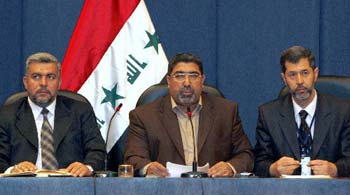| Home / International / International -- News | Tools: Save | Print | E-mail | Most Read |
| Iraq's Sadr Bloc Withdraws from Government |
| Adjust font size: |
Shi'ite cleric Moqtada al-Sadr ordered his ministers to quit Iraq's government Monday in protest at Prime Minister Nuri al-Maliki's refusal to set a timetable for US troops to withdraw. Sadr's populist movement, which draws its support mainly from Iraq's Shi'ite poor, has six ministers and a quarter of the parliamentary seats in Maliki's fractious Shi'ite Alliance, a coalition of Shi'ite Islamist parties. The move exposes cracks in the alliance, which has sought to present a united front despite tensions below the surface, but it is unlikely to significantly weaken the government since Sadrists do not hold key cabinet posts. While Sadr's support was vital to Maliki taking office, the involvement of his Mehdi Army militia in sectarian violence made his bloc's presence in the government a political liability. At the same time there will be concerns about ensuring Sadr's continued support for the US-backed crackdown in Baghdad. His Mehdi Army, which Washington calls the biggest threat to Iraq's security, has kept a low profile so far during the offensive. The Sadrists accused Maliki of "ignoring the will of the people" over the timetable issue and also of failing to improve basic services and security. Baghdad's Sadr City slum is the cleric's main powerbase.
"The prime minister has to express the will of the Iraqi people. They went out in a demonstration in their millions asking for a timetable for withdrawal," the head of the Sadrist bloc in parliament, Nassar al-Rubaie, told a news conference. Tens of thousands of Iraqis answered a call by Sadr to rally in the holy Shi'ite city of Najaf last week to protest against the presence of more than 140,000 US-led forces in Iraq. Sadr himself did not appear - US officials say he is in hiding in Iran, while his aides say he is still in Iraq. Maliki accepted the Sadrists' decision to quit and reiterated that US troops would leave only when Iraqi forces could take over security. "The prime minister welcomes Moqtada al-Sadr's announcement to give him the responsibility of handing the six ministries ... to qualified people and not based on their sectarian affiliation," Maliki's office said in a statement. In Washington, White House spokeswoman Dana Perino said the departure of Sadr's ministers would not bring down Maliki's government. "If the Sadrists were to leave the government - obviously they've said they would before and I understand that they have done that this morning - that does not mean that Maliki loses his majority," she said. US President George W. Bush, who has committed 30,000 additional troops to Iraq, is himself under pressure from a Democratic-controlled Congress to set a timetable. He says that would undercut the Baghad offensive. One analyst said Sadr could be acting to quell internal dissent over his support for the security crackdown, which has failed to stop car bombings blamed on Sunni Islamist Al-Qaida that have targeted Shi'ite neighborhoods in Baghdad. Hazim al-Nu'aimy, a political science professor at Baghdad's Mustansiriya University, said he viewed the pullout as part of a "political game" that was unlikely to spark a crisis. "This is political maneuvering. It's not the first time they've withdrawn from the government," he said, noting that Sadr's movement was keeping its 30 seats in parliament. (China Daily via agencies April 17, 2007) |
| Tools: Save | Print | E-mail | Most Read |
 |
| Related Stories |
 |
 |
|
 |
| Links |
